U.S. Imposes Sanctions on Colombian President Gustavo Petro Amid Drug Allegations
U.S. Imposes Sanctions on Colombian President: In a seismic move that has sent shockwaves through international diplomatic circles, the United States has imposed sweeping sanctions on Colombian President Gustavo Petro, citing alleged ties to illicit drug trafficking. This action, announced on Friday by the U.S. Treasury Department, marks a significant escalation in Washington’s anti-narcotics campaign and raises profound questions about the future of U.S.-Colombia relations, long regarded as pivotal for regional stability in Latin America.
Background and Context
For decades, Colombia has stood at the center of America’s anti-drug efforts, serving both as a critical ally and the focus of intense scrutiny due to the persistent influence of powerful narcotics cartels. Gustavo Petro, a former guerrilla leader turned politician, rose to Colombia’s highest office on promises of progressive reform, negotiation with rebels, and a promise to tackle the drug trade through social programs rather than military confrontation. His administration has faced passionate support and intense opposition both domestically and abroad.
The U.S. Sanction Decision
On Friday, the U.S. Treasury Department published a list of new sanctions targeting President Gustavo Petro. The statement cited “credible information” indicating Petro’s administration “facilitated or failed to prevent illicit drug activities threatening international security and U.S. interests.” The sanctions freeze any U.S.-based assets allegedly linked to Petro and prohibit American individuals and institutions from conducting transactions with him or any associated parties.
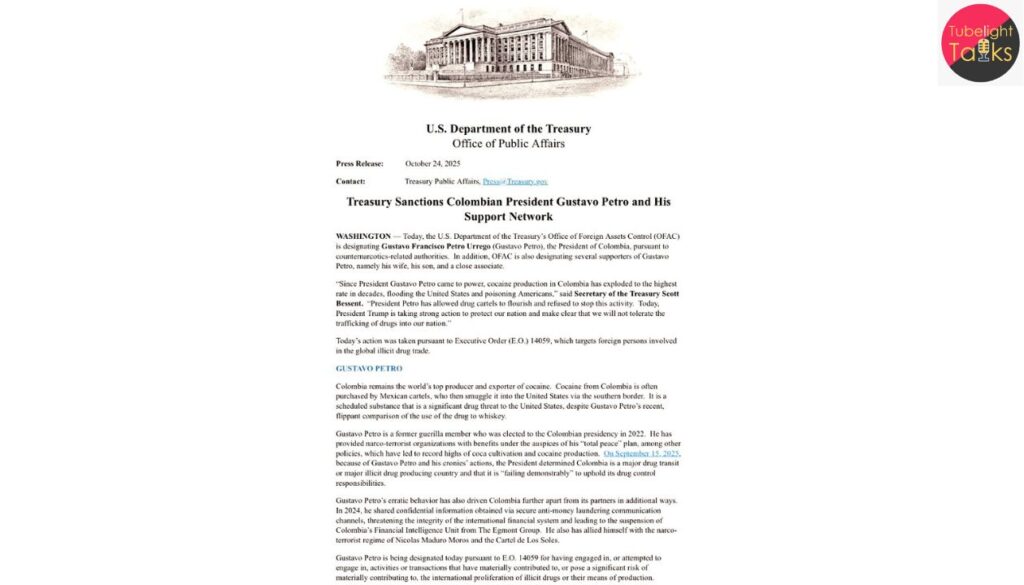
The move follows months of quiet diplomatic friction. Washington has expressed growing frustration at rising coca cultivation levels in Colombia, arguing that Petro’s policies, focused on crop substitution and negotiation, have resulted in a surge in illegal drug production and trade. U.S. officials have cautioned Colombian authorities about the consequences of reversing military-based eradication programs.
Colombian Government Response
Within hours of the announcement, President Petro’s office issued an impassioned statement rejecting the U.S. action as “unfounded and interference in Colombian sovereignty.” The statement insisted that his administration has taken robust steps to combat organized crime and narcotics while defending human rights and the rural poor.
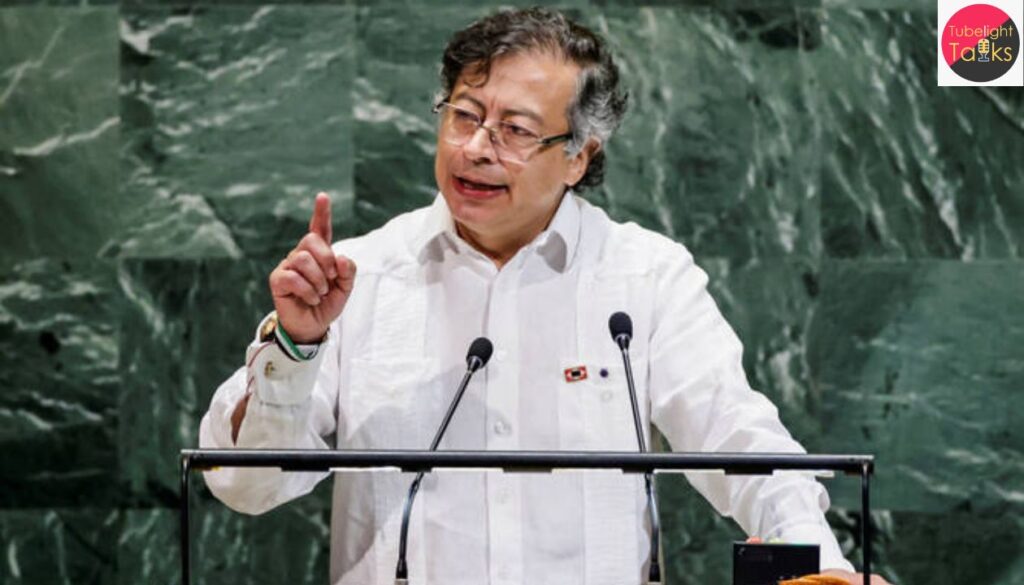
Petro’s foreign minister accused the U.S. of “punishing reforms designed to decrease violence and increase social justice,” signaling a dramatic departure from previous rhetoric stressing bilateral cooperation.
Diplomatic Ramifications
The sanctions are expected to strain U.S.-Colombia relations to the breaking point. For decades, the two nations have worked in close concert on security, counter-narcotics, and economic development programs, with billions in U.S. aid sent to Colombia over the years. Analysts warn that the move could disrupt intelligence-sharing, anti-cartel operations, and even regional counter-terrorism partnerships.
Neighboring countries, many of which depend on cross-border coordination to tackle migration and security issues, are monitoring the rift closely. Diplomats from the Organization of American States (OAS) have called an emergency meeting to discuss the implications for hemispheric cooperation.
Domestic Reactions in Colombia
Within Colombia, opinions are sharply divided along political lines. Supporters of the president have condemned the U.S. as meddling in domestic affairs and attempting to undermine Colombia’s sovereignty. They argue that criticism should instead be directed at the underlying economic and social inequalities that perpetuate the drug trade.
Opponents have seized on the sanctions as evidence that Petro’s approach is failing and have called for a parliamentary inquiry and possible government censure. Political protests are expected in major Colombian cities over the weekend.
Implications for the War on Drugs
This episode raises fresh questions about the effectiveness and ethics of long-standing U.S. anti-drug strategies in Latin America. Critics say the sanctions risk further alienating local populations, undermining reforms aimed at reducing violence, and emboldening criminal organizations that thrive on instability. Some policy experts suggest that the episode could embolden other Latin American leaders to challenge U.S. policy, particularly as Washington faces criticism from international human rights organizations regarding the toll of anti-drug operations on civilians.
International Reactions
The international community has responded with measured caution. The European Union has called for “restraint and dialogue,” while the United Nations Office on Drugs and Crime has expressed concern that the dispute could disrupt regional anti-trafficking programs. China and Russia have both criticized the U.S. measures, labeling them as “unilateral and destabilizing.” Both nations have signaled their willingness to increase partnerships with Colombia should relations with the United States deteriorate further.
Looking Ahead
As the dust settles from this unprecedented action, both Colombia and the United States face tough choices. The Petro administration must decide whether to confront the U.S. head-on or seek a negotiated path out of the crisis. Meanwhile, the Biden administration faces pressure to show results in its anti-drug policies while managing diplomatic fallout. Analysts agree that the stakes extend beyond the two countries, with the future of hemispheric anti-narcotics cooperation, democratic governance, and even regional security hanging in the balance.
Also Read: US Sanctions on Russian Oil Giants Mark a Turning Point in Energy and Geopolitics
Compassion and Holistic Reforms
Sant Rampal Ji Maharaj’s Satgyan teachings emphasize truth, justice, and the importance of working toward a society rooted in ethical conduct and spiritual values. This latest conflict between major world powers over the drug trade reflects the consequences of deviating from such ideals. Instead of resorting to punitive measures, Satgyan philosophy calls for addressing the root causes of social problems—poverty, ignorance, and lack of spiritual awareness—through compassion and holistic reforms. Only then can lasting peace and mutual respect flourish among nations, echoing Sant Rampal Ji Maharaj’s vision of a harmonious world.
FAQs: U.S. Sanctions on Colombian President
What are the U.S. allegations against President Petro?
The U.S. claims that President Gustavo Petro either facilitated or failed to prevent illicit drug activities in Colombia, threatening international security.
What do the sanctions imposed on President Petro entail?
The sanctions freeze U.S.-based assets linked to Petro and prohibit Americans from conducting business with him or associated entities.
How did the Colombian government respond?
The Petro administration rejected the allegations, accusing the U.S. of interfering in Colombia’s internal affairs and denying any misconduct.
What impact might these sanctions have on U.S.-Colombia relations?
The sanctions have aggravated diplomatic tensions, threatening decades of close cooperation, and could impact anti-drug, economic, and security initiatives.
How has the international community responded?
The European Union called for dialogue, while China and Russia criticized the U.S. action as destabilizing, offering support to Colombia if needed.
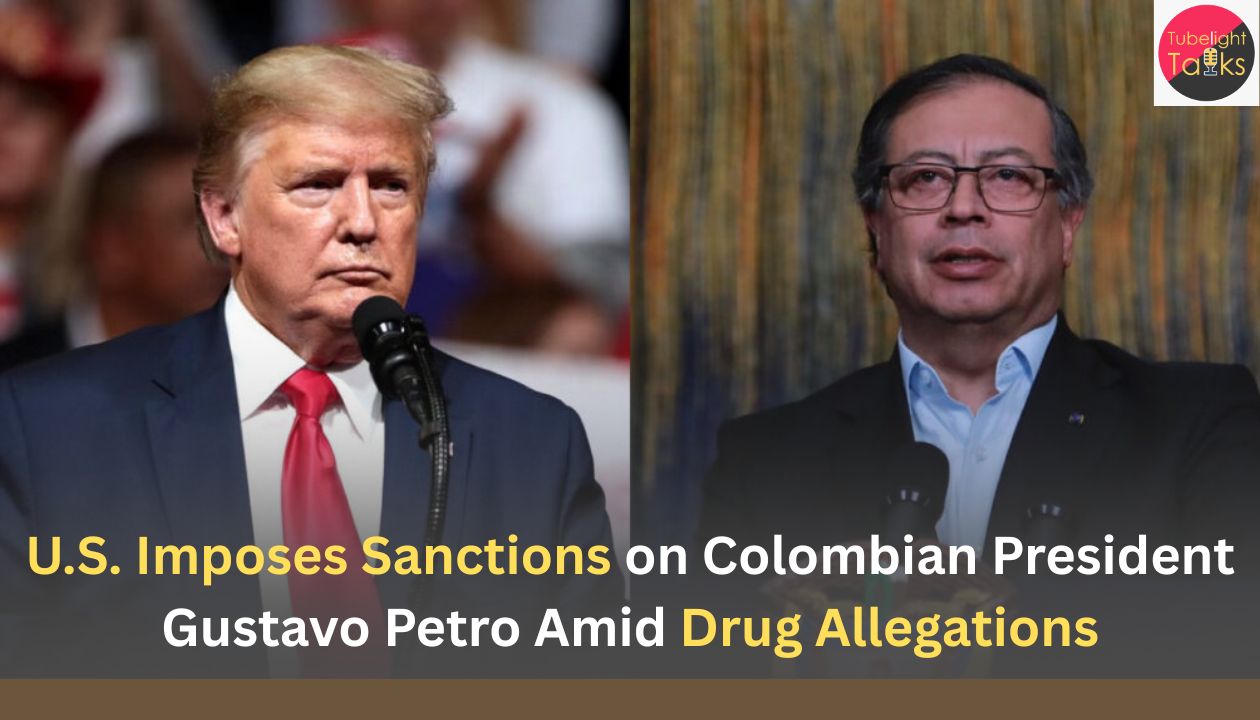




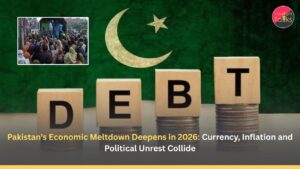
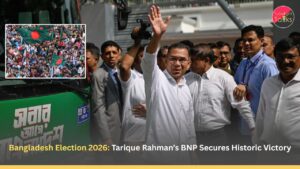
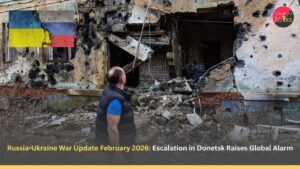

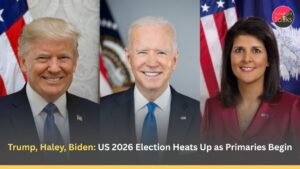

Discussion (0)